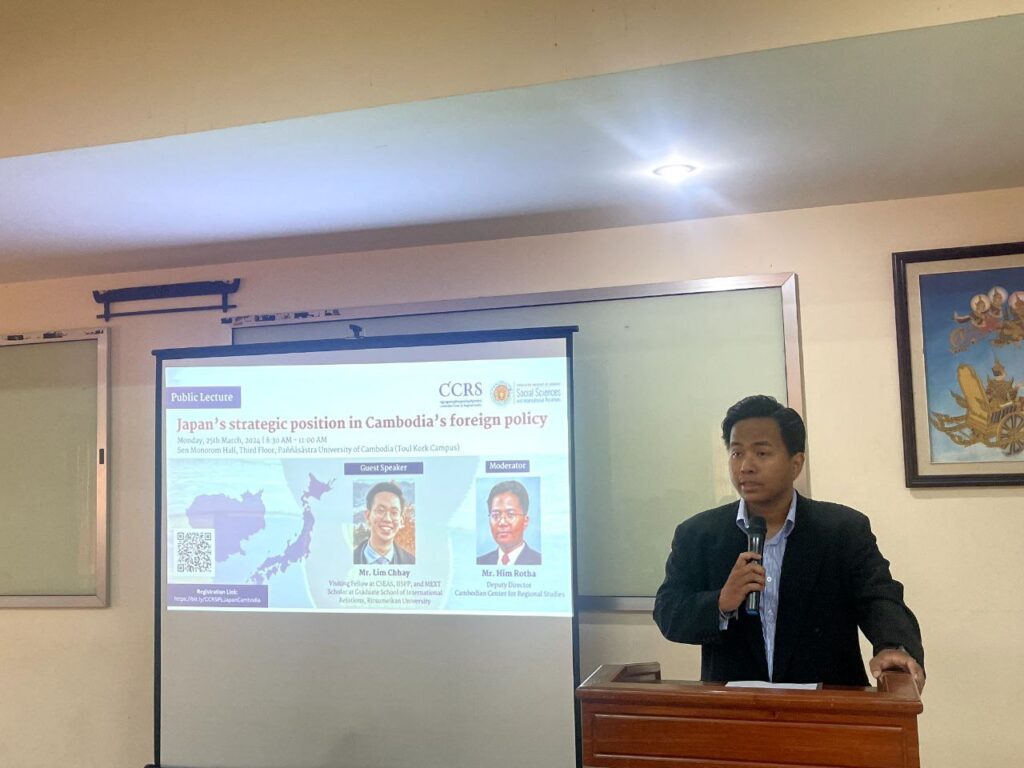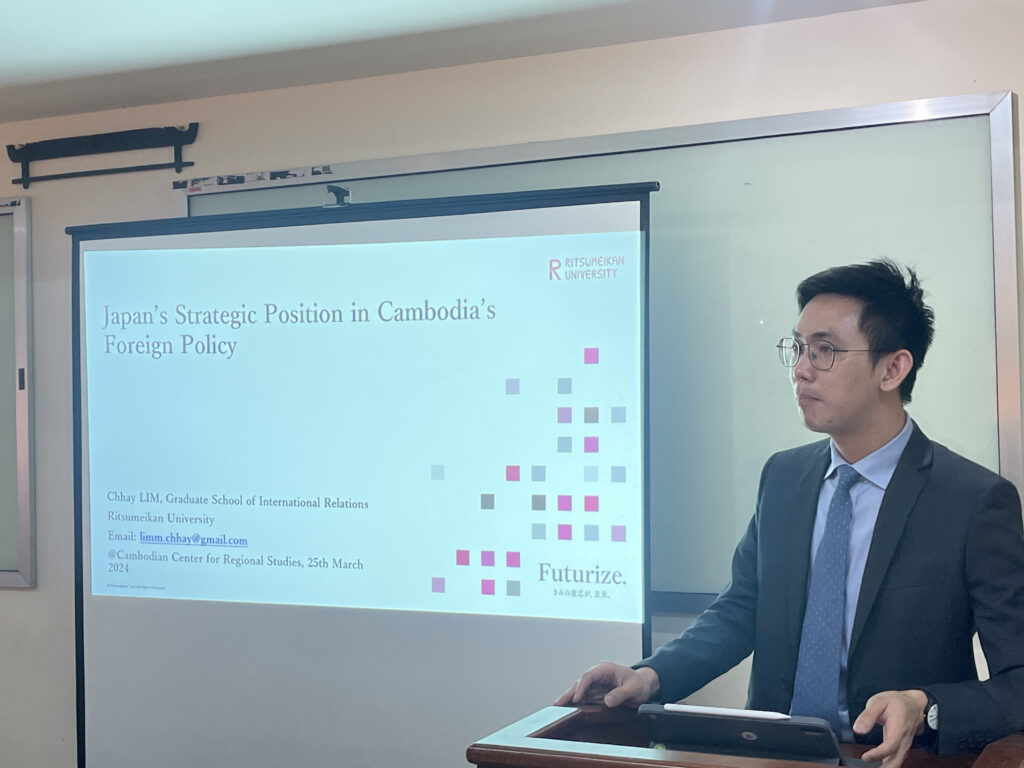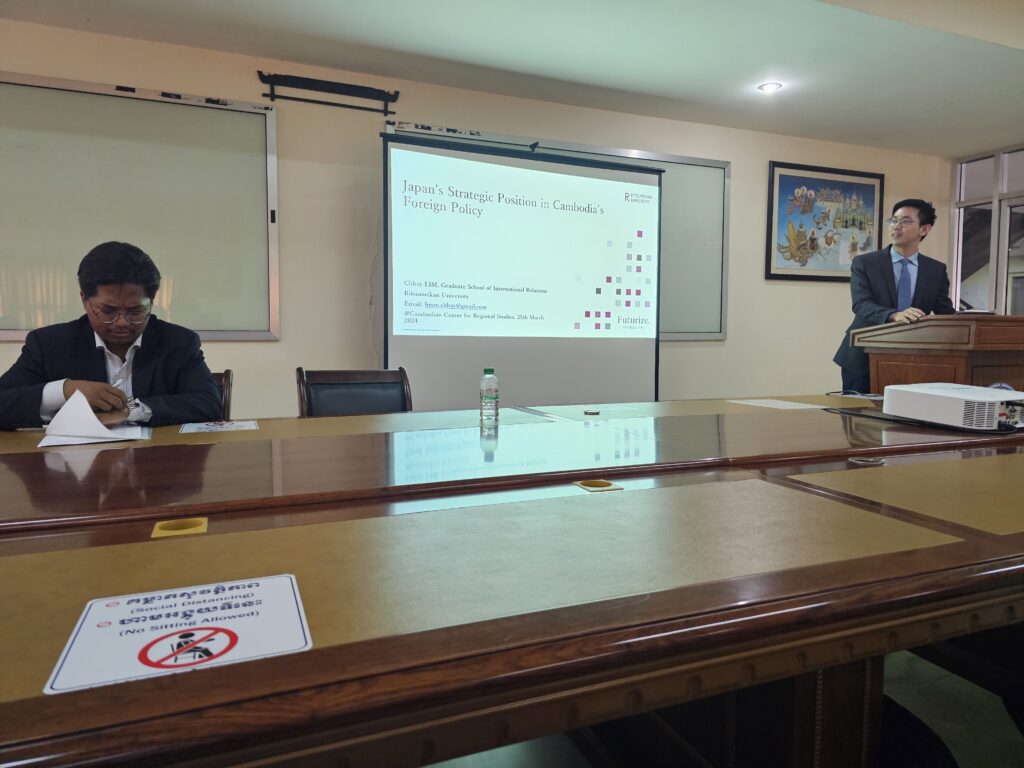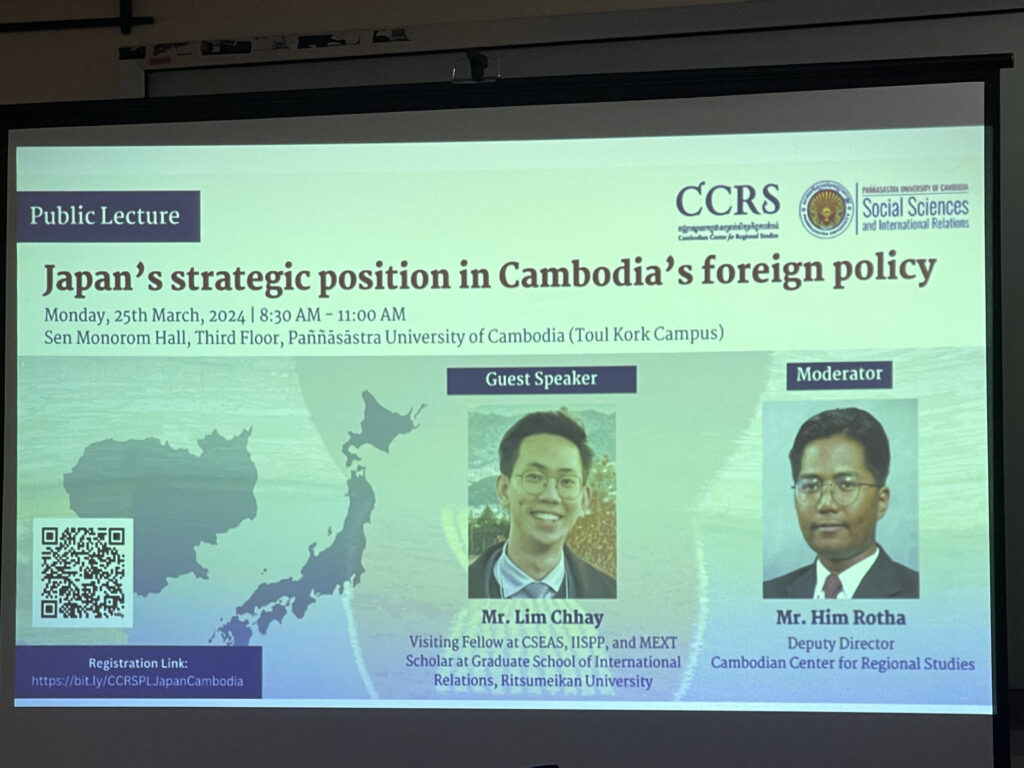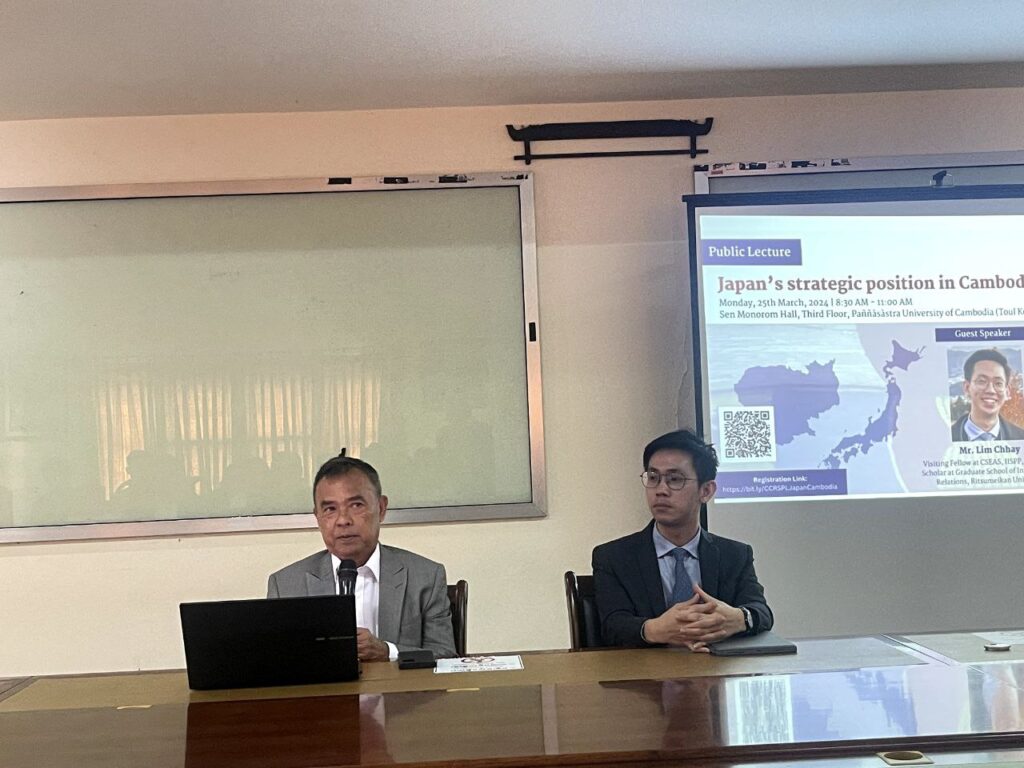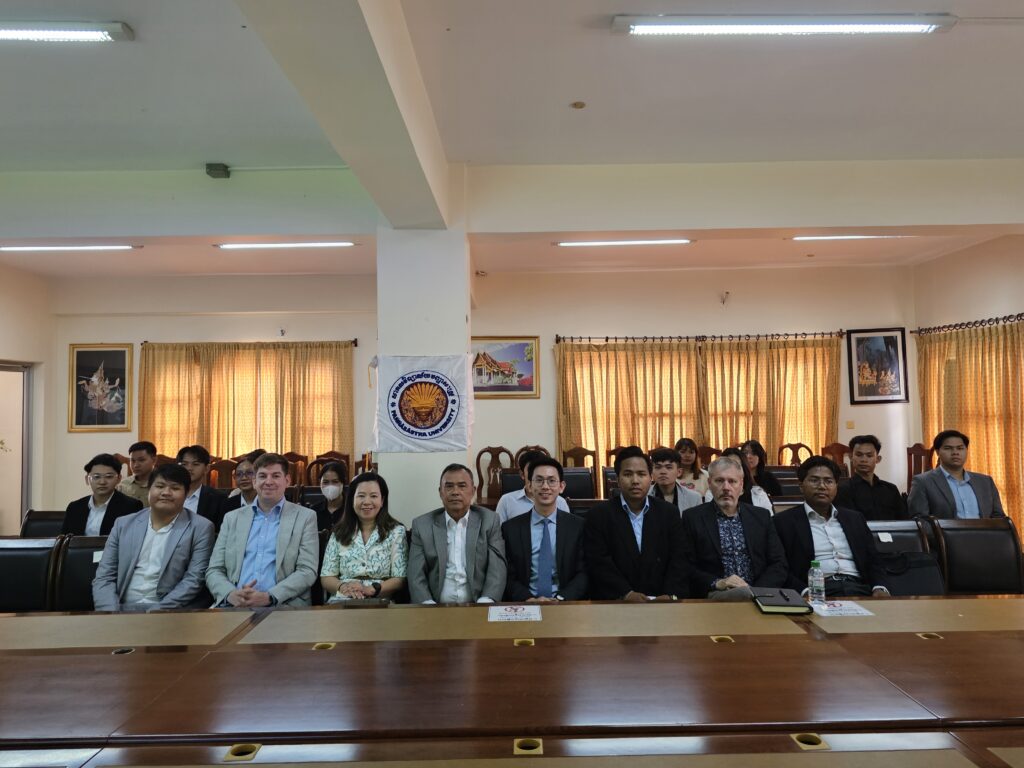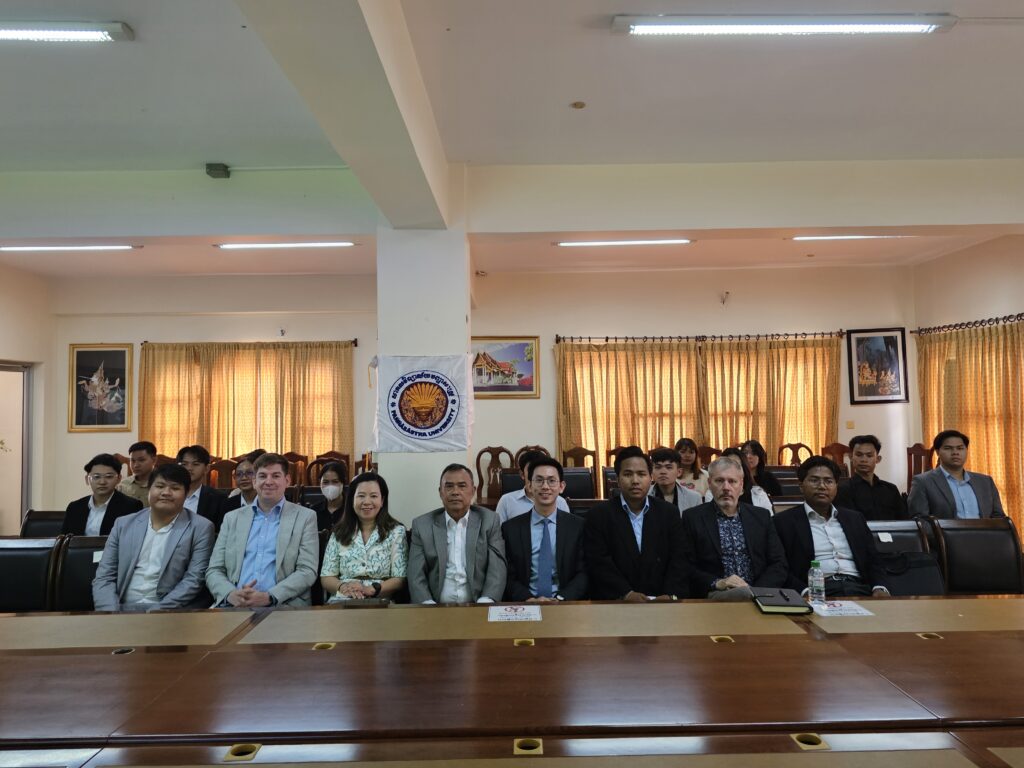On 25 March 2024, CCRS organized a public lecture on “Japan’s Strategic Position in Cambodia’s Foreign Policy” by Mr. Lim Chhay, Visiting Fellow at the Center for Southeast Asian Studies (CSEAS), Institute for International Studies and Public (IISPP), Royal University of Phnom Penh (RUPP) and MEXT Scholar at Ritsumeikan University. The event is supported by Paññāsāstra University of Cambodia’s Faculty of Social Sciences and International Relations. Around 40 participants attended the event, including members of the diplomatic corps.
At the opening session, Mr. Him Raksmey, Executive Director of CCRS warmly greeted all participants to the event. He mentioned that this lecture aims to dive deep on the importance of Japan to Cambodia relations. He expressed appreciation to the special guest speaker, Lim Chhay, Visiting Fellow at Center for Southeast Asian Studies, Institute for International Studies and Public Policy of Royal University of Phnom Penh, and also an appointed-Young Leader for the Pacific Forum International, and a Japanese Government’s MEXT scholar at Ritsumeikan University, who will share his perspective on Japan’s strategic position in Cambodia and discuss the way forward for Cambodia and Japan to enhance the relations under the framework of the recent elevation of Comprehensive Strategic Partnership (CSP).
Chhay Lim’s presentation on Japan’s Strategic Position in Cambodia’s Foreign Policy has two important parts. The first part laid out the role of Japan as a hedging power for Southeast Asia, examining the evolution of strategic engagement between Japan and the region from the Fukuda in the 1970s to the Asian Financial Crisis, and from the phase of the growing Chinese assertion of the South China Sea to the recent increasing Japanese engagement in maritime security cooperation with Southeast Asia through the new Official Security Assistance (OSA). He opined that “A proactive Japan’s ASEAN diplomacy” could be an available option for the region to navigate the US-China competition.
In the second part, the speaker dug into Japan’s role in Cambodia’s foreign policy. He asserted that Japan could be an option for Cambodia to embrace owing. According to him, this is because of three reasons; (1) Japan’s face-saving approach in dealing with domestic issues; (2) working with Japan would not translate as “choosing side” between the US and China; (3) trust asset that Japan had with the Cambodian policy elites.
He then highlighted three important elements of how Cambodia engaged with Japan: (1) diplomacy; (2) socio-economic development; (3) political-security configuration. On diplomacy, Mr. Lim said that Cambodia supported Japan’s foreign policy agendas, including the Free and Open Indo-Pacific Vision. In return, Japan has supported Cambodia’s engagement on the regional and international stage, including the ASEAN Chairmanship in 2022. On socio-economic development, Japan has contributed billions of dollars in term of Official Development Assistance (ODA) and investment to support Cambodia’s soft and hard infrastructure. Lastly, regarding political-security configuration, Japan has quietly worked with Cambodia to deal with the question of democracy and human rights. The cooperation recently expanded to security and defense cooperation.
During the Q and A sessions, our guest speaker and the participants vibrantly discussed with each other on various issues. The exchange focused on the prospects and challenges of Cambodia-Japan bilateral relations amidst the great powers’ competition as well as Japan’s presence in Southeast Asia.
At the closing remarks, Amb. Pou Sothirak, Distinguished Senior Advisor to CCRS gave a big thumb up to Chhay Lim for delivering insightful presentation. Chhay Lim is known to be a young and bright scholar who does not compromise his academic interest who has done serious research work on Japan strategic role in the region and in Cambodia. Amb. Pou Sothirak stressed the important role Japan plays in offering a strategic choice to be a trusted partner with Cambodia, beside China. He offered four key takeaways:
1- Comprehensive Strategic Partnership between Cambodia and Japan can only be healthy only the two sides respect and supports each other determinedly. Cambodia should be more sensitive to the Japan’s national security interest (SCS, China’s rise, Cross-Strait relations, North Korea nuclear threat, the contending issues between China and Japan, rule base order…)
2- Cambodia strengthens ties with Japan fit well in the fresh foreign policy orientation of the new and dynamic young leaders of Cambodia amidst geostrategic competition between US and China.
3- Cambodia should strengthen ties with Japan in all aspects, including maritime security cooperation, focusing on capacity building for a more effective Cambodian coast guard and navy.
4- Cambodia should seek assistance from Japan in the area of technology, digital and innovation as well as attracting Japanese big companies to invest in areas of strategic importance.
On behalf of CCRS, Amb. Pou expressed thankfulness to the guest speaker, Lim Chhay for the insightful lecture, and to Prof. Kevin Nauen for his support in providing the venue for organizing this event. He also thanked all members of CCRS researchers and other participants for attending this lecture.
The event ended in a friendly and cordial atmosphere.
